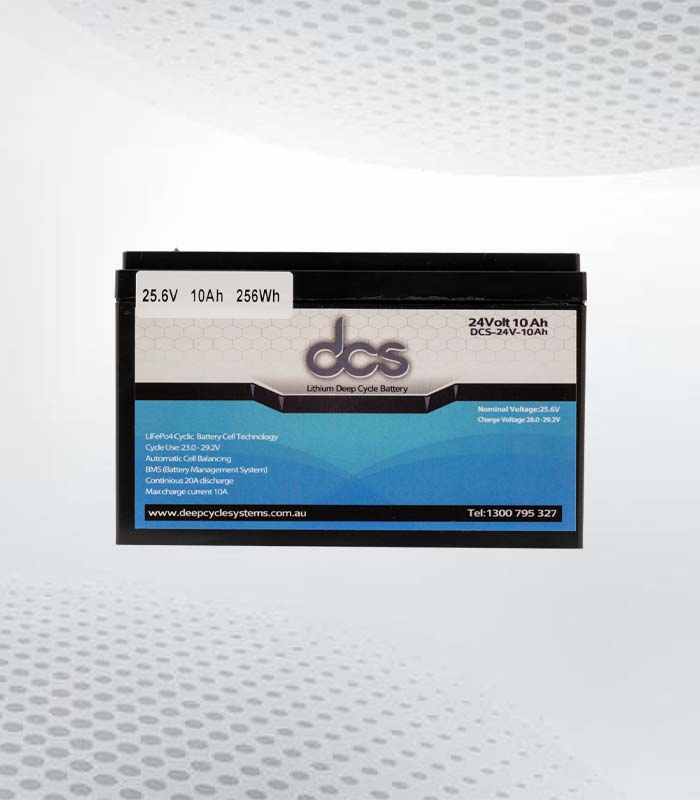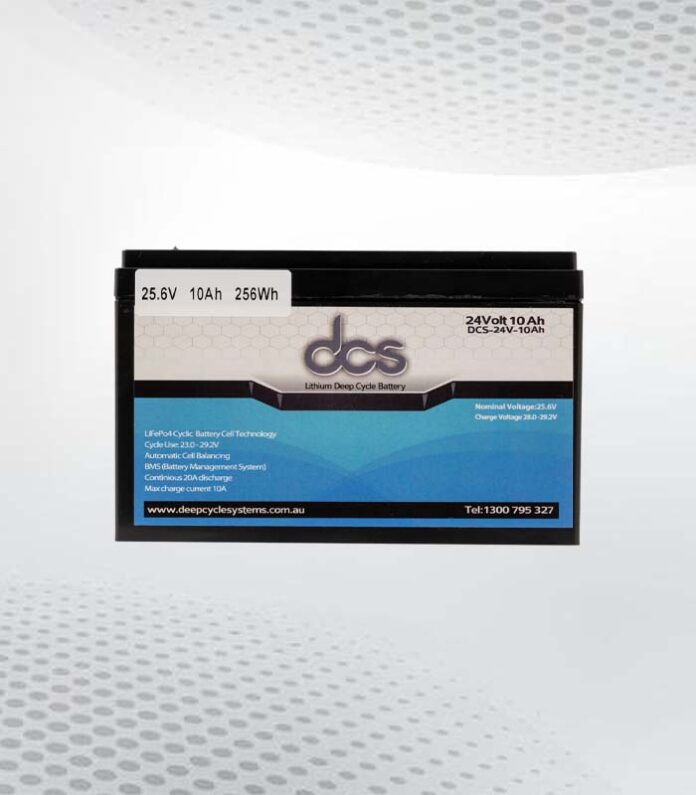In an era where the quest for more efficient, sustainable, and robust energy solutions is more pronounced than ever, the spotlight has increasingly shifted towards advanced battery technology. Among these, the 24v Deep-Cycle Battery technology is a beacon of reliability and efficiency. This blog post delves into the essence of 24v Deep-Cycle batteries, their advantages, applications, and the bright future in this field.
Understanding the Basics of 24v Deep-Cycle Batteries
Its unique ability to deliver consistent power over extended periods is at the core of the 24V deep-cycle battery technology. Unlike conventional starter batteries built to provide high current bursts for a short duration, deep cycle batteries are engineered to discharge and recharge over many cycles. The 24V deep-cycle battery design integrates two 12V cells connected in series, effectively doubling the voltage to achieve 24 volts. This series connection not only enhances energy storage efficiency but also caters to the power demands of applications that surpass the limitations of a 12V system.
The hallmark of these batteries lies in their resilience and capacity to repeatedly deplete up to 80% of their total charge, without significant degradation. This characteristic is paramount for scenarios where a dependable and prolonged power supply is essential. Given their design and operational mechanics, 24v Deep-Cycle batteries find their niche in applications that demand a steady, long-term energy source. By leveraging the intrinsic properties of these batteries, users can harness a reliable power solution that aligns with the requirements of sustained and substantial energy consumption, thus marking the essence of what 24v Deep-Cycle technology brings to the table in the landscape of modern energy solutions.
The Advantages of Opting for 24v Deep-Cycle Technology
One of the foremost benefits of embracing 24v Deep-Cycle technology is its unparalleled capacity for sustained energy delivery over prolonged periods. This characteristic is invaluable in settings that require a constant power supply, such as off-grid power solutions and renewable energy systems. The technology’s design facilitates a deeper discharge without significant efficiency loss, which markedly extends the battery’s operational life compared to conventional alternatives. This extended lifespan not only represents a sound long-term investment but also contributes to reducing waste and replacement costs.
Moreover, these batteries exhibit superior space and weight efficiency. By offering a higher voltage in a more compact and lighter configuration than equivalent power setups using 12V batteries, users can optimize space and reduce the load in various applications. This aspect particularly benefits electric vehicles and mobile setups, where space and weight considerations are critical.
Another key advantage lies in the economic value of 24v Deep-Cycle batteries. While providing a robust and reliable power source, they maintain a cost-effective price point, making them an attractive option for commercial and personal use. Their superior temperature resistance further enhances their appeal, ensuring reliable performance across various environmental conditions. These advantages underscore the suitability of 24v Deep-Cycle technology for a broad spectrum of applications, promising efficiency, durability, and value.
Comparing 24v Deep-Cycle with Other Battery Technologies
When examining the landscape of battery technologies, 24v Deep-Cycle variants present a compelling suite of benefits distinct from their counterparts. Compared to the advanced lithium-ion type, these batteries offer a more cost-effective solution whilst still providing excellent resilience across varying temperatures. Lithium-ion variants may boast higher energy density and longer charge cycles. However, the affordability and robustness of 24v Deep-Cycle batteries render them particularly attractive for applications where initial investment and operational reliability in extreme conditions are paramount considerations.
Unlike traditional lead-acid batteries, 24v Deep-Cycle models excel because they can endure deeper discharge levels without significant performance degradation. This capability is critical for systems requiring a reliable power supply over extended periods, enhancing their suitability for long-term deployments in remote or demanding environments.
Moreover, considering the environmental perspective, it’s essential to note that 24V deep-cycle batteries, particularly those based on lead-acid technology, offer recyclability advantages. This aspect, coupled with ongoing research to improve their environmental footprint, positions them as a considerate choice amidst growing sustainability concerns.
In summary, choosing between 24v Deep-Cycle batteries and other technologies hinges on specific application needs, including cost considerations, performance requirements under varying environmental conditions, and sustainability goals. Each technology has its strengths, with 24v Deep-Cycle batteries standing out for their robustness, affordability, and adaptability to a wide range of uses.
Applications Unleashed: Where 24v Deep-Cycle Shines
The versatility of 24v Deep-Cycle batteries is demonstrated across various applications, highlighting their value in today’s energy landscape. In the renewable energy sectors, such as solar and wind power, these batteries provide a reliable storage solution, ensuring energy harvested during peak times is readily available during demand surges or low production periods. This capability is crucial for maintaining a consistent energy supply and enhancing the overall efficiency of renewable systems.
In mobility, electric vehicles (EVs) and recreational vehicles (RVs) benefit significantly from the compact yet powerful nature of 24v Deep-Cycle batteries. These energy sources support the propulsion systems and power auxiliary components critical to vehicle operation and occupant comfort. Similarly, marine vessels utilize these batteries to ensure seamless operation of both navigation systems and life-support utilities, demonstrating their adaptability to demanding environments.
Furthermore, the importance of 24v Deep-Cycle batteries in facilitating off-grid lifestyles and ensuring continuity in power supply for critical infrastructure cannot be overstated. By providing a dependable and durable power reserve, these batteries enable sustainable living solutions and provide an essential backup for healthcare facilities, communication networks, and emergency services, highlighting their integral role in modern and future energy frameworks.
24v Battery Deep Cycle
Diving deeper into the realm of 24v battery deep cycle technology unveils a plethora of attributes that set it apart in the energy storage domain. At the heart of its design lies the meticulous engineering aimed at facilitating a balance between energy density and durability. This harmonious integration enables these batteries to endure the rigors of frequent deep discharges whilst maintaining their structural integrity and performance over time.
The nuanced architecture of 24v Deep-Cycle batteries incorporates advanced plate materials and electrolyte formulations, which are pivotal in enhancing their cycle life and efficiency. Such innovations have paved the way for these batteries to emerge as a cornerstone in applications that demand reliability under extended operational cycles.
 Further setting the stage for their prominence, the technology behind 24v Deep-Cycle batteries embraces an eco-conscious approach. The use of recyclable materials and the development towards more sustainable production practices underscore the industry’s commitment to reducing environmental impact. This aligns with the global shift towards green energy solutions and positions 24v Deep-Cycle batteries as a key player in the drive for environmental sustainability.
Further setting the stage for their prominence, the technology behind 24v Deep-Cycle batteries embraces an eco-conscious approach. The use of recyclable materials and the development towards more sustainable production practices underscore the industry’s commitment to reducing environmental impact. This aligns with the global shift towards green energy solutions and positions 24v Deep-Cycle batteries as a key player in the drive for environmental sustainability.
In essence, the 24v battery deep-cycle technology embodies a fusion of performance, resilience, and eco-friendliness. It stands as a beacon of progress in the energy sector, pushing the boundaries of what is possible in power storage and management, without compromising on environmental values.
The Future of 24v Deep-Cycle Technology and Its Impact on the Energy Sector
As we venture further into a world prioritizing sustainable energy solutions, the trajectory of 24v Deep-Cycle technology heralds a new era of innovation and environmental stewardship within the energy sector. The continued development in this field is set to markedly enhance the performance characteristics of these batteries, such as their energy density, cycle life, and overall reliability. Emerging materials science and engineering breakthroughs are at the forefront of pushing these boundaries, promising batteries that not only last longer but also perform more efficiently under a broader spectrum of conditions.
A significant area of focus involves the reduction of the carbon footprint associated with the production and recycling of these batteries. Advances in green chemistry and renewable energy integration within manufacturing processes underscore the industry’s commitment to minimizing environmental impact. Furthermore, the exploration of alternative, less harmful materials in battery construction aims to mitigate the ecological concerns traditionally associated with battery use.
The adoption of 24v Deep-Cycle technology across various sectors, from renewable energy storage to electric mobility, is poised to accelerate, driven by its enhanced capabilities and environmental benefits. This shift not only underscores the vital role of 24v Deep-Cycle batteries in the transition towards greener energy systems but also highlights the potential for these technologies to contribute to global sustainability goals, reshaping our approach to energy consumption and resource conservation in the process.
24v Deep Cycle
Delving into the technical nuances of 24v Deep Cycle battery technology reveals a landscape where innovation and performance converge. These batteries are engineered with a focus on achieving an optimal balance between power retention and longevity, setting them apart in the arena of energy storage. The architecture of a 24v deep-cycle battery is characterized by its robust plate designs and advanced electrolyte solutions. These elements are critical in facilitating the battery’s ability to withstand numerous deep discharge cycles while preserving its structural integrity and operational efficiency.
A pivotal aspect of these batteries is their adaptability to a wide array of energy demands, underpinned by their design and construction which prioritizes cycle stability and energy consistency. The innovative use of materials in their manufacture not only enhances their performance but also contributes to their environmental credentials. Efforts to incorporate more sustainable and less impactful resources into battery production reflect a broader industry move towards greener alternatives.
The development trajectory of 24v Deep-Cycle technology is also notable for its focus on improving electrolyte formulations. These advancements aim to increase energy density and reduce self-discharge rates, thereby bolstering the battery’s efficacy across diverse applications. As the energy sector continues to evolve, the enhancements in 24v Deep-Cycle batteries underscore their growing significance in achieving higher standards of power storage and sustainability.
FAQs
1. What is the typical lifespan of a 24V deep-cycle battery?
The lifespan of a 24V deep-cycle battery is generally influenced by how it is used and maintained. On average, these batteries can last between four and eight years. It is worth noting that adhering to recommended discharge depths and ensuring proper maintenance routines can significantly prolong a battery’s useful life.
2. Is it possible to connect 24v Deep-Cycle batteries in series or parallel configurations?
Indeed, 24v Deep-Cycle batteries are versatile in terms of configuration; they can be connected in series to increase the system’s overall voltage or in parallel to augment the capacity (Ah), catering to the specific needs of different applications.
3. To what extent are 24v Deep-Cycle batteries considered environmentally friendly?
24v Deep-Cycle batteries, particularly those based on lead-acid technology, are notable for their recyclability, which mitigates some of the environmental impacts associated with battery use. The industry is actively pursuing innovations in materials and manufacturing processes to further reduce the ecological footprint of these batteries.
Conclusion
The progression and enhancement of 24v Deep-Cycle battery technology signify a pivotal stride towards achieving greener, more resilient energy storage solutions. As the world gravitates towards sustainability, the role these batteries play in facilitating a shift to renewable energy sources becomes increasingly critical. Their adaptability across a spectrum of applications, from bolstering renewable energy systems to powering electric vehicles, underscores their value in an evolving energy landscape. The journey of continuous innovation in 24v Deep-Cycle technology is set against the backdrop of a pressing need for sustainable energy solutions. With advancements aimed at extending battery life, improving efficiency under diverse conditions, and reducing environmental impacts, these batteries are at the forefront of addressing global energy challenges.
| Related Business Listings |
| Contact Directory |
| Local Business Profiles |

